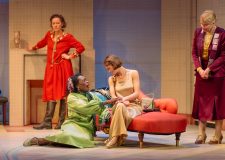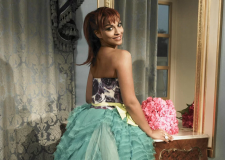The Rake’s Progress
It seems incredible that this production of Igor Stravinsky’s opera with a libretto by W H Auden and Chester Callman is 46 years old. Nearly half a century has passed since it was first staged in the old house at Glyndebourne and yet it appears as fresh as a daisy in every sense. Clearly the thought behind this production, the pairing of director John Cox with artist David Hockney was a stroke of genius.
Hockney’s designs are beautiful, representing Hogarth’s London in a series of flat visions, like those one would find in a Pollock’s paper theatre, using a classic technique of pen-stroke cross hatching and a palette of colours that are reminiscent of Quink Ink colours. The effect is both delightful and comic, it has a spontaneity and freshness, imperfections are left in place, mistakes left un-corrected and the vision of Hogarth’s world is prettily grimy.
Stravinsky played against this vision becomes clear and easy to follow and the libretto created by Auden and Callman is so carefully written that the whole is not only easy to follow but also to understand. Seldom is the provision of supertitles less necessary. I hardly read a word.
Of course much of that is down to the brilliant direction of John Cox who allows the company to tell the story with a simple and refreshing clarity, no tricksy pretensions here, just storytelling at its best.
That in turn is down to a very fine cast, a set of fine voices brought to life by excellent acting skills. Anne Trulove is delightfully sung and played by Nardus Williams, a purity and innocence that starkly contrasts with what is to come from her lover Tom Rakewell. Tom is played with real strength by Frederick Jones, his voice soaringly powerful and the clarity of his diction astounding, every word clear in both tone and meaning.
Father Trulove is equally strong in Stephen Richardson’s performance, the doting and worried father turned by the promise of riches.
But that comfort disappears at the arrival of Nick Shadow, here played by the extraordinarily dark presence of Sam Carl who brings a sense of both grande guignol and pantomime to the role. He’s the villain that you want to love, the dark force that is so so believably attractive, it’s little wonder that he leads Tom into a life of debauchery and excess and finally into the arms of Baba The Turk. And why would he not fall for the weirdly sexy bearded lady here played with total conviction by Rosie Aldridge.
Praise must also go to the rest of the company, the excellent chorus and Glyndebourne Touring Orchestra all under the baton of Keres Hassan who conducts with sensitive confidence. Hats off too the the backstage talents who realise the work of Hockney in both set and costume.
Stravinsky, Auden, Callman and Hockney, a combination that makes one wonder if there is ever going to be the need for a re-staging of this work. It would be easy to see that this production will still be in the Glyndebourne repertoire for another 50 years and maybe more.
Andrew Kay
23 October
[rating 5/5]





















